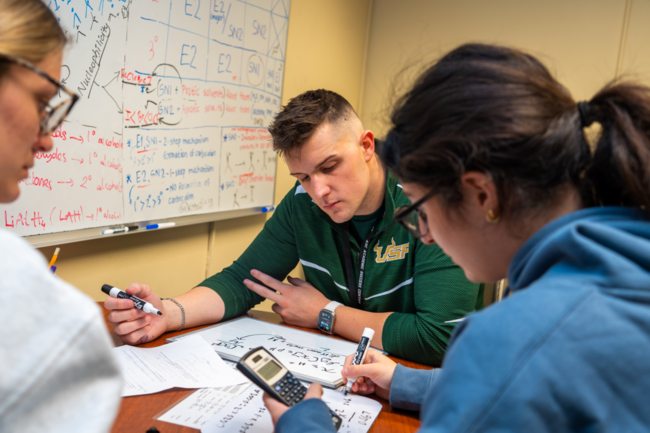You have /5 articles left.
Sign up for a free account or log in.

Peer-supported learning interventions at the Academic Support Center are one area where the University of South Florida has expanded academic support services.
University of South Florida
Colleges and universities are home to an array of resources to help students thrive and succeed, but many students don’t know about them. Just over half (56 percent) of college students say they’re aware of tutoring and academic supports on campus, compared to 94 percent of college employees who say their campus offers the resources.
At the University of South Florida, the Academic Success Center is a central office in the library that houses tutoring, the writing lab, peer mentoring and supplemental instruction, among other academic support offerings for undergraduates.
Zoraya Betancourt became director of the center in 2020 during a challenging time, she said—in part because the center had to reintroduce itself to incoming students who had never been on campus and those who had their college experience disrupted by COVID-19.
National data shows that students at large public institutions are spending less time studying outside of class now compared to during the 2018–19 academic year, and they are less likely to participate in a study group with their peers.
“For me, it was like, OK, we are going to have to be very different. We can’t go back to who we were,” Betancourt said.
Spurred by student data and feedback, Betancourt and her team led a remodel of the center to be more responsive to student needs and meet them where they are.
Data-based decisions: To start, Betancourt partnered with Steve Johnson, a data scientist on the university’s Predictive Analytics Research for Student Success team, to build a dashboard of student data.
“For many years the only data we had was how many students come and use the services how many times,” as well as some student identification data, Betancourt said. “I always thought we need more than that—we need to know more than that.”
Now, Betancourt has access to student majors, colleges and the types of services they utilize to identify high-demand subjects and create responsive learning support schedules. The dashboard also connects the way services are tied to student retention and outcome goals.
In addition to automating some work, the dashboard allows staff to engage students more directly. Each week, the system generates a report of new visitors to the center, which staff use to reach out and personally welcome students to the center and its services.
A care-centered model: One trend that became clear in student interactions was the prevalence of stress in the student experience, Betancourt said. “Our tutors are coming to us and saying, ‘I have a student … and I don’t know how to help them.’”
In response, the office adopted a care model for referrals that quickly connects support staff with other departments, reducing opportunities for students to fall through the cracks.
“Within this referral system, we can go in and see if a student who is using our services says, ‘I really need to change my major and I don’t know what to do, I’m really stressing out over it,’” Betancourt said. “We’re able to go into the system and refer them directly to an adviser.”
Larry Billue Jr. serves as the Academic Success Center point person for care management, guiding students to counseling support, financial aid, basic needs support and academic advisers or just sitting with the student to discuss how they’re feeling.
Increased peer engagement: Another new feature of the ACS was supplemental instruction. While the academic intervention has been around for decades, it was new to the university and created opportunities for increased collaboration between staff and faculty to promote academic success, as well as create jobs for student employees.
“That became more evident because we were hearing from students, ‘I need more than just tutoring. I like working with my peers,’” Betancourt said.
At USF, supplemental instruction is called PASS, short for peer-assisted study sessions. The ACS is tracking student participation in PASS to gauge use.
Students can also sign up to receive remote tutoring in select courses through the PORTAL (peer online resources for tutoring and learning), to supplement in-person opportunities when the office may be closed.
The impact: Over the past year, the center has seen a 75 percent year-over-year increase in student use.
Having a care team member on board has also been successful; Billue Jr. can physically walk a student across campus to the relevant office and make introductions as needed.
“It’s been well received by students; they take him up on the offer and they’ll walk with him,” Betancourt said.
The center has also expanded training for academic peer mentors to address not only study strategies and effective learning practices, but also how to make referrals to other offices.
The biggest lesson Betancourt has learned: There are a range of opportunities to engage students and connect with them, understanding those opportunities just requires a deeper look at what students need.
“We serve to engage students on campus, to engage students with each other, to engage students with faculty and with staff, and it’s looking at that a little bit closer to improve our services and how we can build on that,” Betancourt said.
Do you have an academic intervention that might help others improve student success? Tell us about it.



